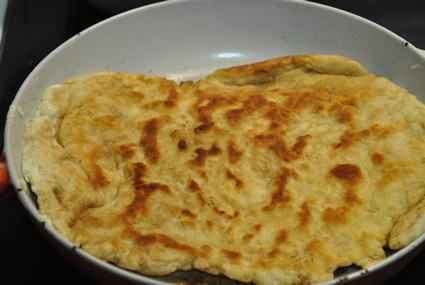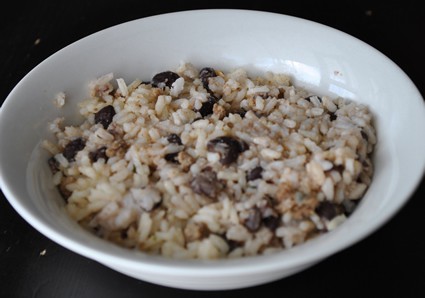For Christmas my husband and I decided to give our children a gift that would keep on giving, so we decided to sponsor a Compassion child in honor of our kids. It was such an awesome gift that the whole family would enjoy.

Our kids were so excited to have another brother, but didn’t understand why he couldn’t come live with us. After we explained how Compassion worked they were a little disappointed that he wasn’t coming to live with us, but were thrilled to be a part of his life.
Right after Christmas I set out to make a New Year’s resolution for the upcoming year. I was inspired by a Compassion blog post to choose just one word as my resolution. As I prayed and thought about my one word for 2012, I felt the Lord leading me to the word ‘sacrifice.’
I didn’t know exactly what all that would entail, but I was thrilled to see what God would do in my life.
I also felt led to plan a monthly sacrifice challenge that my family and I would embark on for one week out of each month. For the month of January we decided to sacrifice in the area of food.
We had just received our information packet about our Compassion child so we decided to eat only what a child in Uganda would eat for a whole week.
I did some research and the last week of January we started a challenge that seemed like it would be fun and easy. We quickly found out that it was harder than we had imagined, but well worth it!
As I researched, I found that the typical family in Uganda would eat bananas, pineapple, rice, maize, millet bread or flat bread, g-nuts, sweet potatoes, white potatoes, stew, beef or goat, and tea.
For our challenge, meals consisted of a lot of flatbread, corn, rice, beans, pineapple, beef, nuts, and potatoes.
For some this might seem like huge sacrifice, for others not as much. At first it seemed we had a lot of options but after a couple of days we saw how limited our menu options were. Here are a couple of things I prepared that week.
Ugandan stew – A traditional dish served over rice.

Flatbread – We had this with almost every meal.

Rice and Beans – A staple for our week.

We learned so much through this challenge. There were things we learned that would have been impossible to learn without sacrificing in this way. Things like,
- Peer pressure from friends.
My son’s classmates thought it was really odd and strange that I would make him do this challenge. Two of our children struggled with what others might think of their lunch. - Taste
I quickly learned that our family is not a huge fan of mangos or beans. - Deprivation
My son Garrett wasn’t able to have brownies that a mom brought in for the class. He came home in tears very upset that he didn’t get what everyone else had. At the root he was glad that he made the right choice and stuck with the challenge even though he really wanted a brownie. - Desires
I really wanted to eat things that were not on the menu! It can be hard to put our desires on the back burner especially when everything is so readily available to us. - Convenience
It can be challenging to plan and prepare a different diet. - Balanced Foods
We were eating so many starchy foods that my body was craving veggies and chocolate. I am only kidding about the chocolate, but at the end of the challenge there were things I was ready to eat again.
Over and over throughout the week we were reminded of the Israelites. It is easy to read a Biblical account and imagine we would do things differently if we were in their shoes.
We quickly realized that we too were exactly like the Israelites! Even though we had much more than the manna that was given to God’s chosen people we complained very quickly.
This challenge gave us the opportunity to be thankful for what we have even when we didn’t have as much to chose from. Now every time my children complain about a food that I serve I remind them that we can always go back to eating Ugandan food.
It stops the complaining every time!
ABOUT THE AUTHOR Valerie Hopkins is a pastor’s wife located in a small town of Virginia. She loves serving the Lord and seeing Him do the impossible. Valerie also enjoys blogging, going on missions trips, teaching Bible studies, and being a wife and mom!
If you’re interested in writing a guest blog post, we are happy to consider publishing it. Read our guest blog post guidelines.







18 Comments |Add a comment
This is a great idea…based on what I read of my sponsored children, our options would be beans and rice only! But I agree…I’m sure it would be an important lesson in many ways. For me and my children. Thank you for sharing your experience!
While I understand and appreciate the idea of sacrifice and getting to know what your sponsored child is going through nutritionally, I am not totally in favor of depriving young children and young teens of a balanced diet–even for a week. Why put them through that? It seems like overkill. One meal–that I could understand, but a whole week is a little much. If those kids in the picture are yours, they are a growing bunch. If the kids were all young adults and chose to do this of their own free will, that is another matter. My question is how well did they do at school that week while they were hungry? How did your teen son play sports with a diet lacking in protein and calories? Over the top parenting on your part, sorry. A big thumbs down from me.
Maybe I misunderstood the post, but I didn’t think the blog was about literally only eating as much as our children may eat, but to eat similar food to what they eat in larger quantities. I would agree that making children hungry for a whole week is not healthy although those of a certain age are old enough to fast safely on the short term.
I saw the blog as doing more meals with less variety and pre-packaged foods, which is quite healthy. I frequently eat beans as they are an economical source of protein. I don’t see their diet being protein deficient if they are eating beans and beef on a daily basis in reasonable quantities. It also looks as if the Ugandan stew has vegtables, which would be the only thing I could see the diet missing. A dietician I know through friends has mentioned many times that nobody eats perfectly each day and a few days of eating less balanced meals will not make a long term difference if one goes back to eating healthier. Sadly, many people prefer to eat high carb, high fat, low protein diets, which are lacking in fruits and vegtables and needed protein nutrition.
Hi Tracy, This is Valerie the writer of the article. While I appreciate your honesty I would like to clear up a few things. In an article like this I wasn’t able to share everything that the kids ate day to day. Each day we had a very balanced meal with the options we were given. We did have tons of protien with beef, beans, and nuts. We had fruits like bananas, mango, and pineapple. We also had cornmeal, flatbread, and rice. Each meal consisted of a protien, carb, fruit, and veggie (even though the veggies were very limited.) The kids never went hungry we just limited our diet to what our child in Uganda would eat and it was a week of great blessing! God did an amazing work in our lives and we were able to learn so much that we wouldn’t learn otherwise. Our teen son is a foster son that no longer lives with us so he wasn’t apart of the challenge, but he would have really enjoyed it if he was. I hope this clears up our eating habits a little bit for you. I hope you have an awesome week! Blessings to you,
Valerie
I love this idea. I’ve sponsored a child in Bolivia for nearly 10 years. I spent a month there in 2003, but it was winter (July here is winter there) and veggies were scarce. I couldn’t wait to get home and eat a salad! And having hot soup every day was new to me. I’ve incorporated a few Bolivian dishes into my diet, most notably quinoa and soup! I just sponsored a little girl from Guatemala, and I’m researching her diet now. Thanks for the challenge! I’m getting ready to try. But I don’t have any small children at home that I have to “sell the idea” to. I commend you for taking on THAT challenge!
This is such a great idea! Having spent a week in Uganda last summer, I can honestly say you got the menu right on! One thing I would have added is cabbage, which is surprisingly delicious! I had never tried cooked cabbage before but after eating it for at least one meal a day for the entire week I actually came home and made it myself!
Lauren, I did a lot of research on Ugandan food before starting the journey. I didn’t see cabbage anywhere, but wish I would have know because it would have added some variety. I like cooked cabbage and would loved to have added it that week. Blessings to you! Valerie
This is a very interesting idea. I’ll just have to try it.
-Nicole
http://changingtheworldinbabysteps.blogspot.com/
A blog about an ordinary teenager with an extraordinary plan.
I wouldn’t have any problem eating like another country does rich or poor. I’m in awe of how God creates food and works it to be given to all those who trust in Him for it all around the world. I’m not a picky eater and I’m grateful for what I have.
Keep in mind that what you’re accustomed to will also determine how much of a challenge it is.
For me, as someone who grew up in Africa, that meal looks extremely appealing and eating it every day is fine in my mind. When I visited a couple years ago I was in heaven eating African food every day again.
However, I’m used to abundance just like most Westerners. And so that is a really good point you made: that we have choices here and can pretty much have whatever we want when we want it. In fact, I find we often demand choices (myself included) as if they are our right when they’re really a privilege.
For me the sacrifice is removing my right to choices, eating less than what I want, and not being able to just go pull something out of the cupboard/refrigerator or run to the store whenever I’m hungry.
Great point K-eM! I totally agree that it could be a huge challenge for some and not a big deal to others. Since that challenge we have seen food in a new way. Food had become such an idol that it was good for us to step back and gain a new view. We have made some life changing decisions because of the challenges we have participated in this year. Thanks for your comment!! Blessings, Valerie
Wow that was an awesome journey taken. I cried when I read this story feeling the sacrifice and uncomfortableness ya’ll had with peer pressure and doing without. What an awesome testimony. Thank you so much for sharing your experience. God Bless you!!!!
Wow… what a great idea. Hmm, we may need to do this later this month. Thanks for sharing.
We support a Compassion child as a family and oh the joy it brings to us. The kids call him “our boy”. He feels like part of the family..that is a wonderful idea to eat the foods that are part of their everyday life..We talk to the children about how he lives and such and the food he eats, what a way to teach them that they are so blessed and how important it is to pray for “our boy”
I love this idea! I am going to try to get my family on board to try it for one week.
I’d love to try this, but my sponsored child is from Kenya, and her diet is very similar to the Ugandan diet. Actually, I love rice, beans, flatbread, pineapple, mango, etc. The problem is I am diabetic and these are all foods that are high in carbs and shoot my blood sugar through the roof –especially rice. I can eat beans and fruit, if I’m careful with portion sizes, but rice puts my sugar on the roof. Since I really do try to keep my sugar well controlled, eating a lot of sweets isn’t a daily ritual anyway, although I do eat some.
My sacrifice has been to stay away from getting anything in the mornings for breakfast from a fast food place, even high-protein foods which don’t bother my sugar, but aren’t healthy, anyway.
Just thought I’d throw that in the discussion pile for those of us who can’t eat a lot of carbs.
I agree this is harder that it 1st looks. I stayed in the Philippines for 2 weeks with an ordinary family. We had rice at every meal, fish sometimes, I couldn’t go to the pantry for a cookie (no pantry or even a cupboard) the rats or bugs would have eaten them any way or bake a pan of brownies (no oven) no ingredients. They went to a shop each day to buy the food to prepare. For a few pesos we could walk to a shop and get a treat or buy drinking water. We finally went to a McD’s for a plain ol hamburger.
That is a wonderful challenge to do. Maybe I’ll get my husband on board to do that with me. We made a dish from our child’s country when we started sponsoring, but never thought to try to sustain ourselves on their diet for a period of time. Sounds like it certainly had its challenges and brought about a new appreciation for what God has blessed us with. God bless you for your sponsorship and dedication to children!!! 🙂